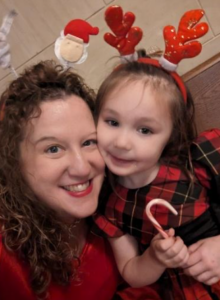After completing a long week of facilitating in-person workshops, I decided to take a moment and review some of the feedback and thank you notes from my workshop participants over the past year. The most powerful and consistent feedback from my ImprovEdge sessions include comments like “thank you so much for inspiring us to step outside of our comfort zone,” “It was such an amazing and safe space that you created” and “I never volunteer for anything, yet I felt safe enough to stand up as the first volunteer in this workshop.”
These comments speak to the core of what we do at ImprovEdge. Using improvisational techniques to teach business skills allows participants to try new skills and behaviors in a space that promotes and encourages adult learning. As adults, our comfort zone is a place where we feel safe and secure in the predictability of our environment and behaviors. Humans are creatures of habit; we rely on those routines that we know well and that we can complete well. (Van Gelderen M. 2023.) It takes courage for us to move beyond the familiar which challenges our daily habits and behaviors. This first step outside of our comfort zone strengthens our ability to adapt, capacity to learn, and promotes behavioral change.
Yale neuroscientist Dr. Daeyeol Lee explains it this way: “Perhaps the most important insight from our study is that the function of the brain as well as the nature of learning is not ‘fixed’ but adapts according to the stability of the environment… When you enter a more novel and volatile environment, this might enhance the tendency for the brain to absorb more information.”
I want to be clear that improvisation does create a space of discomfort, and it also can be a space of comfortable discomfort. Not all facilitators understand that extreme discomfort creates a worse experience. It’s critical to get that balance right – between stretching a bit and feeling as though you are still safe and learning. Participants should be encouraged to participate in a way that challenges them to try something new – volunteer in front of the group, engage as a listener, or try a new skill. As one participant shared, “I was a little bit nervous going into this workshop because I wasn’t sure what would happen, but you were an amazing coach that made the experience much easier to navigate.” This is at the core of the workshops that I design, and at the core of what our facilitators bring to every experience. The ImprovEdge experience creates a brave space where learners can practice new behaviors, skills, and techniques without the barriers that prevent us from trying new things in our everyday lives.
I want to issue a challenge to you. The next time that you are asked to share your thoughts, lead a meeting, introduce a speaker, or try a new skill, step slightly outside of your comfort zone – behave like an improviser and try the new experience.
References: Van Gelderen M. (2023). Using a comfort zone model and daily life situations to develop entrepreneurial competencies and an entrepreneurial mindset. Frontiers in Psychology, 14, 1136707
 April Olt is the Senior Director of Content and Talent and leveraging more than 15 years in the professional development industry, April leads the design and delivery of all ImprovEdge client experiences. She received her B.F.A. in Theatre Performance from Illinois Wesleyan University and her M.F.A. in Directing/Dramaturgy from Roosevelt University in Chicago. April has worked with theatre companies and creative artists as a coach, director, producer, and dramaturg in NYC, Chicago, Columbus, and LA where she currently resides.
April Olt is the Senior Director of Content and Talent and leveraging more than 15 years in the professional development industry, April leads the design and delivery of all ImprovEdge client experiences. She received her B.F.A. in Theatre Performance from Illinois Wesleyan University and her M.F.A. in Directing/Dramaturgy from Roosevelt University in Chicago. April has worked with theatre companies and creative artists as a coach, director, producer, and dramaturg in NYC, Chicago, Columbus, and LA where she currently resides.
April can be found making faces and improvising all over Los Angeles with her niece.
